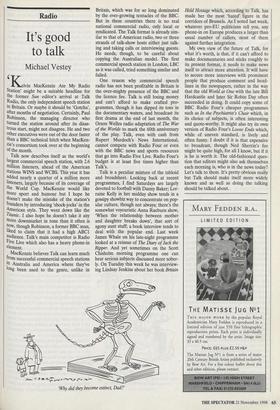Radio
It's good to talk
Michael Vestey
Klvin MacKenzie Ate My Radio Station' might be a suitable headline for the former Sun editor's arrival at Talk Radio, the only independent speech station in Britain. Or maybe it should be `Gotcha', after months of negotiation. Certainly, Paul Robinson, the managing director who turned the station around after its disas- trous start, might not disagree. He and two other executives were out of the door faster than a BBC technical hitch when MacKen- zie's consortium took over at the beginning of the month.
Talk now describes itself as the world's largest commercial speech station, with 2.6 million listeners, ahead of the American stations WINS and WCBS. This year it has added nearly a quarter of a million more listeners, largely because of its coverage of the World Cup. MacKenzie would like more sport and humour but I hope he doesn't make the mistake of the station's founders by introducing 'shock-jocks' in the American style. They went down like the Titanic. I also hope he doesn't take it any More downmarket in tone than it often is now, though Robinson, a former BBC man, liked to claim that it had a high ABC1 audience. Talk's main competitor is Radio Five Live which also has a heavy phone-in element.
MacKenzie believes Talk can learn much from successful commercial speech stations in Australia and America where they've long been used to the genre, unlike in Britain, which was for so long dominated by the ever-growing tentacles of the BBC. But in these countries there is no real national commercial radio, only local or syndicated. The Talk format is already sim- ilar to that of American radio, two or three strands of talk-show hosts either just talk- ing and taking calls or interviewing guests. He needs, though, to be careful about copying the Australian model. The first commercial speech station in London, LBC as it was called, tried something similar and failed.
One reason why commercial speech radio has not been profitable in Britain is the over-mighty presence of the BBC and the licence fee. Talk is still losing money and can't afford to make crafted pro- grammes, though it has dipped its toes in the documentary waters, and broadcast its first drama at the end of last month, the Orson Welles radio adaptation of The War of the Worlds to mark the 60th anniversary of the play. Talk, even with cash from Rupert Murdoch's News International, cannot compete with Radio Four or even with the BBC news and sports resources that go into Radio Five Live. Radio Four's budget is at least five times higher than Talk's.
Talk is a peculiar mixture of the tabloid and broadsheet. Looking back at recent programmes, I find Saturdays are largely devoted to football with Danny Baker; Lor- raine Kelly in her midday show tends in a gossipy showbiz way to concentrate on pop- ular culture, though not always; there's the somewhat voyeuristic Anna Raeburn show, `When the relationship between mother and daughter breaks down', that sort of agony aunt stuff; a book interview tends to deal with the popular end. Last week James Whale on his late-night programme looked at a reissue of The Diary of Jack the Ripper. And yet sometimes on the Scott Chisholm morning programme one can hear serious subjects discussed more sober- ly. On Tuesday this week he was interview- ing Lindsay Jenkins about her book Britain `Why did they become extinct, Dad?' Held Hostage which, according to Talk, has made her the most 'hated' figure in the corridors of Brussels. As I noted last week, whatever pro-EU politicians tell you, any phone-in on Europe produces a larger than usual number of callers, most of them against further integration.
My own view of the future of Talk, for what it's worth, is that, if it can't afford to make documentaries and sticks roughly to its present format, it needs to make news itself to attract more attention. It will have to secure more interviews with prominent people that produce comment and head- lines in the newspapers, rather in the way that the old World at One with the late Bill Hardcastle and later Sir Robin Day often succeeded in doing. It could copy some of BBC Radio Four's cheaper programmes such as In the Psychiatrist's Chair which, in its choice of subjects, is often interesting and quote-worthy. It might also try its own version of Radio Four's Loose Ends which, while of uneven standard, is lively and often funny. I doubt if it is that expensive to broadcast, though Ned Sherrin's fee might be quite high, for all I know, but if it is he is worth it. The old-fashioned ques- tion that editors might also ask themselves each morning is, who is in the news today? Let's talk to them. It's pretty obvious really but Talk should make itself more widely known and as well as doing the talking should be talked about.


















































































 Previous page
Previous page